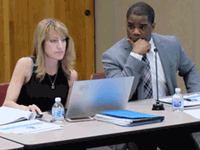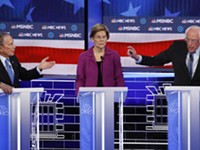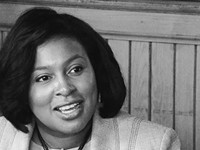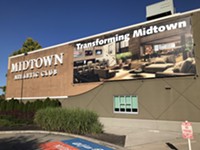[
{
"name": "500x250 Ad",
"insertPoint": "5",
"component": "15667920",
"parentWrapperClass": "",
"requiredCountToDisplay": "1"
}
]
It's going to be worse than I had expected, this period of vitriol masquerading as a presidential election campaign.
Voters should be so appalled by the Republicans' demagoguery that they flock to Kerry. But that doesn't seem likely to happen. There was confidence beneath the taunts and muscle-flexing at the Republican convention last week. The Bush campaign wouldn't turn Zell Miller loose in prime time if there were any risk of a backlash.
Bush and Cheney, it is clear, will base the last two months of their campaign on lies, convinced that voters will believe anything if it's repeated often enough.
Listen to the statements from MadisonSquareGarden:
"Businesses are creating jobs," said Vice President Dick Cheney. "People are returning to work."
"The Bush tax cuts are working," said Cheney.
This in the face of continued reports that there's been no increase in jobs during the Bush presidency. And this on the heels of the Census Bureau report that the number of people living in poverty grew last year, as it has every year since President Bush took office. That median family income has fallen, with poor and middle-income people hurt the most. That the disparity between rich and poor has grown.
"Our nation has the best health care in the world," said Cheney, "and President Bush is making it more affordable and accessible to all Americans."
The Census Bureau report told a different story. The number of people without health insurance grew to a record level last year. In New York, the uninsured rate over the past three years has averaged 15.5 percent; in Texas and New Mexico, more than 20 percent.
"America is safer with George W. Bush as president," said Arnold Schwarzenegger. This despite increased terrorism around the world, continued instability and violence in Iraq, the serious nuclear threat from North Korea and Iran.
Of all the lies, the most serious is that the nation is safer because we invaded Iraq. In the current issue of Atlantic magazine, James Fallows gives a damning assessment of that claim. Fallows has spent part of the past two years interviewing people he says are "at the working level of America's anti-terrorism efforts." Most, he says, "are in the military, the intelligence agencies, and the diplomatic service; some are in think tanks and nongovernmental agencies."
Most, he said, "tend to see America's response to 9/11 as a catastrophe."
Some of his sources believe the United States had no choice but to go to war, based on what was thought to be good intelligence. "But about the conduct and effect of the war in Iraq," writes Fallows, "one view prevails: it has increased the threats America faces, and has reduced the military, financial, and diplomatic tools with which we can respond."
"It is hard to find a counterterrorism specialist who thinks that the Iraq war has reduced rather than increased the threat to the United States," writes Fallows.
Among the concerns voiced by Fallows' sources: From the outset, the Bush administration was preparing to invade Iraq, even as it went after Al Qaeda and the Taliban in Afghanistan. Among the results:
• We diluted our energy, focus, and resources in Afghanistan, permitting Osama bin Laden to escape. He is at large today, directing and inspiring terrorism.
• We did not stabilize Afghanistan, diverting resources --- including personnel knowledgeable about Al Qaeda --- to the pending invasion of Iraq. Now, the Taliban continues to fight in Afghanistan. Money from drug trade there is believed to be funding terrorist groups.
• Although North Korea and Iran posed a much larger threat --- most serious, the threat of nuclear weapons, which they were developing --- the Bush administration was focused almost exclusively on Iraq. "If the very worst pre-war suspicions about Saddam Hussein's weapons of mass destruction had turned out to be true," writes Fallows, "the nuclear stakes would still have been lower than those in North Korea or Iran."
"With the United States preoccupied by Iraq," writes Fallows, "these two other countries surged ahead.... Because it lost time and squandered resources, the United States now has no good options for dealing with either country."
"Before America went to war in Iraq," says Fallows, "its military power seemed limitless. There was less need to actually apply it when all adversaries knew that any time we did so we would win. Now the limits on our military's manpower and sustainability are all too obvious."
"The North Koreans, the Chinese, the Iranians, the Syrians, and others who have always needed to take into account the chances of US military intervention now realize that America has no stomach for additional war."
• We have increased the hostility of the Islamic world toward the United States, and fostered terrorism throughout the world.
• We have not adequately focused on and funded essential anti-terrorism measures in this country. US borders continue to be sieve-like. Writes Fallows: "Some nine million shipping containers enter American ports each year; only two percent of them are physically inspected, because inspecting more would be too expensive."
The war's cost extends far beyond foreign policy and homeland security. It is driving up the budget deficit. It will shortchange desperately needed domestic programs.
This is not complicated stuff. But Bush and Cheney, hoping to deflect voters' attention from the facts, have launched a campaign of fear. They are pounding away at the message that John Kerry isn't concerned about terrorism and can't be trusted to lead the nation at this critical time.
Are voters willing to do the tough citizens' work of analyzing issues? Or will we let the harsh, fear-based message of the Bush-Cheney campaign overwhelm us?
Republicans say John Kerry is not fit to serve. He is, of course. But will we be fit to vote?
Speaking of...
Latest in Columns
More by Mary Anna Towler
-

Police reform: advocates on what should come next
Oct 22, 2019 -

Court clears the way for Police Accountability referendum
Oct 17, 2019 -

Dade outlines initial actions on district deficit
Oct 9, 2019 - More »








